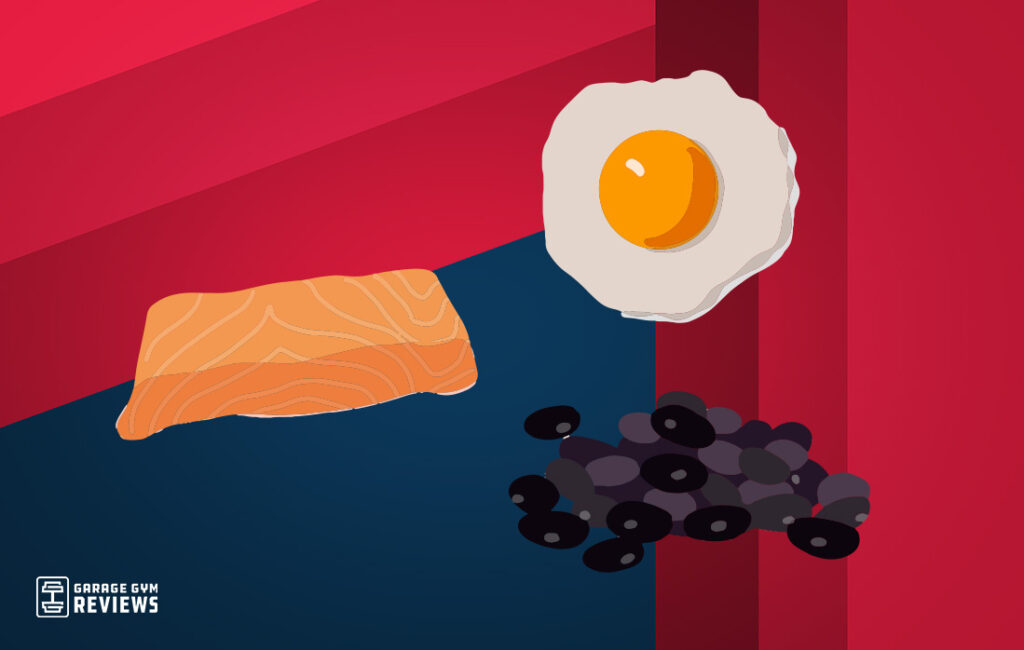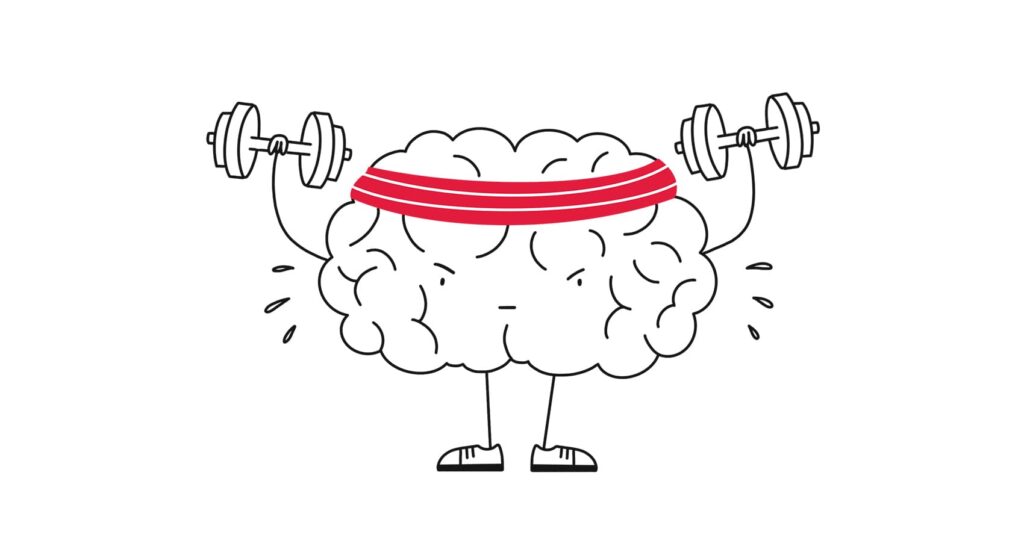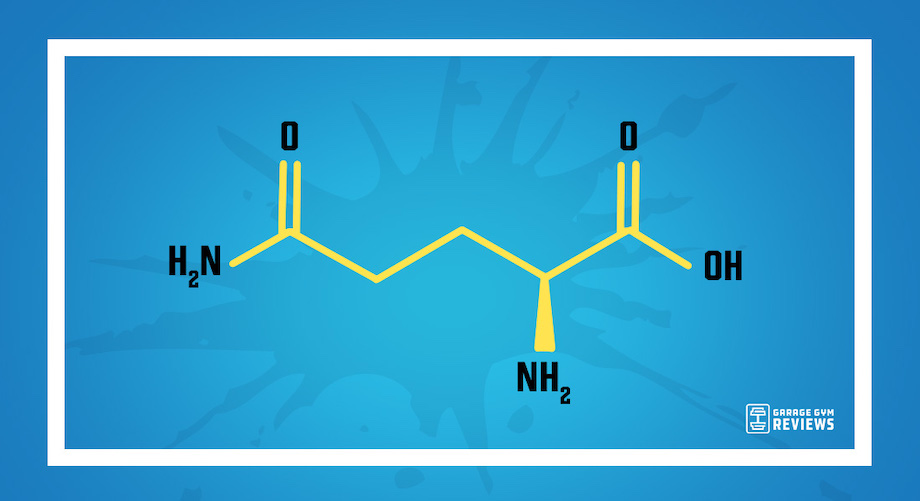If you want to improve your gut health, you might search for the best probiotic. If you’re looking to strengthen your immune system, a vitamin C supplement might come to mind. And if you want to improve your well-being, don’t overlook the link between exercise and mental health.
All of those options can be beneficial, and are even supported by research, but another component deserves consideration…
Entering the chat: glutamine. That’s right, the functions and benefits of glutamine are impressive and range from immune health, gut health, and brain health—and that’s just scratching the surface.
Because we at GGR don’t settle for the bare minimum, we’re diving deep into the research. So, join us as we delve into all things glutamine.
Medical disclaimer: This article is intended for educational and informational purposes only. It is not intended as a substitute for medical advice. For health advice, contact a licensed healthcare provider
What Is Glutamine?
Glutamine is a non-essential amino acid that helps build proteins in the body. But don’t let “non-essential” fool you—glutamine plays important roles that support immune health, digestive health, and so much more, which we’re eager to showcase in the upcoming sections.
Like almost all amino acids1, glutamine is found naturally in two forms: L-glutamine and D-glutamine. However, L-glutamine is present more predominantly in living organisms and the form found in foods and supplements—either labeled as ‘L-glutamine’ or broadly just as ‘glutamine.’
While glutamine can be found in high-protein foods, the body produces it naturally in large amounts. It’s considered the most abundant amino acid in the body, as well as the most versatile.
However, there are times when the body requires more glutamine than what it can produce. When this happens, glutamine is considered a “conditionally essential amino acid.”
A Quick Guide to Amino Acids
Amino acids2 are the building blocks of protein, a macronutrient along with carbohydrates and fat. Remarkably, while there are hundreds of amino acids found in nature, only about 20 of them are required to build all of the proteins found in the human body.

These protein building blocks mostly fall into one of two amino acid categories: essential amino acids and non-essential amino acids. Brained-chain amino acids are a subcategory of amino acids, along with conditionally essential amino acids that include glutamine.
Essential Amino Acids
Essential amino acids must be consumed from protein-rich foods because the body cannot make them on its own. Out of the 20 amino acids, nine of them are essential and include:
- Histidine
- Isoleucine
- Leucine
- Lysine
- Methionine
- Phenylalanine
- Threonine
- Tryptophan
- Valine
Foods that contain all nine essential amino acids are referred to as “complete proteins,” which are primarily found in animal proteins like beef and chicken. Plant-based proteins—except for a select few such as soybeans and quinoa—lack all nine essential amino acids and are considered “incomplete proteins.”
To provide your body with all nine essential amino acids, nutrition experts encourage varying protein sources. Eating a wide variety of plant-based proteins is especially important for those following a vegetarian or vegan diet.
Non-Essential Amino Acids
Unlike essential amino acids, non-essential amino acids can be produced by the body—mostly from glucose, the main sugar found in the blood—if they aren’t consumed from protein foods. So to clarify, “non-essential” does not mean they aren’t essential to the body, just that they aren’t essential to obtain in the diet [in most cases].
The 11 non-essential amino acids include:
- Alanine
- Arginine*
- Asparagine
- Aspartic acid
- Cysteine*
- Glutamic acid
- Glutamine*
- Glycine*
- Proline*
- Serine*
- Tyrosine*
The asterisked non-essential amino acids are also considered “conditional amino acids.” This means under certain conditions—like times of stress and inflammation—the body likely cannot produce enough to meet its needs and dietary intake and/or supplement is warranted.
Branched-Chain Amino Acids
Branched-chain amino acids3, or simply BCAAs, are essential amino acids with protein anabolic properties. The three branched-chain amino acids include:
- Isoleucine
- Leucine
- Valine
While the research on the benefits of BCAAs is mixed, fitness goers often use them in an effort to enhance their performance and recovery. If interested in trying out BCAAs, we recommend leaning on these best BCAA supplements approved by a nutritionist.
How Glutamine Works In The Body
Because glutamine is the most abundant and versatile amino acid, there’s quite a bit to unpack. But we’ll do our very best to keep the intricate and complex details straight to the point—first, by simplifying how glutamine works under normal body conditions, then capping off the conversation with how it works in certain “conditional” situations.
Glutamine Under Normal Body Conditions
Under normal conditions, very little dietary glutamine is used. Instead, the skeletal muscle tissue houses most of the body’s glutamine and can produce it in large amounts—accounting for 90% of all glutamine synthesized.
Glutamine is released into the bloodstream so it can act as an energy source for various cells, including lymphocytes (a type of white blood cell), hepatocytes (liver cells), and enterocytes (intestinal cells). It’s released with the help of the enzyme glutamate synthetase, which is present in skeletal muscle, the brain, kidneys, and the liver.
Glutamine also transports nitrogen—one of the body’s main components—throughout the body to help produce proteins, hormones, neurotransmitters, and components of antioxidant defense. The brain also uses glutamine to create glutamic acid and gamma-aminobutyric acid as well.
To recap, glutamine production, use, and storage—especially in the muscles—is plentiful and optimally functional under normal conditions. This is when glutamine is considered a non-essential amino acid, although certain conditions call for additional needs.
Glutamine Under Stressful Conditions
Under times of stress—like when sick or injured—is when glutamine becomes a conditionally essential amino acid. This is because the body increases the number of cells that rely on glutamine, such as needing more lymphocytes to fight infection, and the body’s demand exceeds the glutamine supply it has.
So, now what? Let’s explore the potential outcomes if the body does and does not receive adequate glutamine during certain conditions:
- Glutamine needs exceed the body’s supply: The body will start to deplete energy stores, particularly in skeletal muscle, to gain access to glutamine. This mostly causes catabolism—which is especially risky during times of starvation, stress, and illness—and eventual muscle breakdown, poor wound healing, and more negative health effects.
- Glutamine needs are met during “conditional” situations: The risks of catabolism are fewer and supplementation helps reduce muscle loss in patients under stress.
Don’t worry, we’ll fill you in on how to meet your body’s needs shortly. Overall, when you provide the body with extra glutamine—via protein-rich foods and/or L-glutamine supplementation—during “conditional” times, the small intestine will break it down so it can be absorbed into the bloodstream and be used optimally.
Benefits of Glutamine
As the most versatile and abundant amino acid in the body, it’s not so surprising that the health benefits and functions of glutamine are impressive. Let’s continue highlighting its critical roles, shall we?
Bolsters Immune Function and Healing
Research4 heavily supports that glutamine is essential for cell proliferation—the increase in cells due to cell growth and division—and enhances the function of stimulated immune cells. What this means is that the body uses glutamine at a higher rate to positively impact immune cells—like lymphocytes, macrophages, and neutrophils—to fight infection and inflammation.
Also recall that during catabolic conditions, like when fighting off an infection, glutamine availability can be compromised. For this reason, a study published in Nutrients5 informs us that glutamine is a part of clinical nutrition supplementation protocols and/or recommended for immune-suppressed individuals.
The immune system also plays an active and critical role in wound healing, an essential process to restore tissue function and prevent the risks of infection that could eventually be life-threatening. A 2021 meta-analysis6 further suggests glutamine supplementation might enhance wound healing.
Improves Intestinal Health
The roles of glutamine in the intestine7 are equally critical and impressive—and because the intestine uses about 30% of total glutamine, it’s a key nutrient for the intestine. For starters, glutamine promotes the growth of intestinal cells known as enterocytes.
Glutamine also helps lower intestinal inflammation, which may help treat intestinal diseases like ulcerative colitis, Crohn’s disease, and colorectal cancer. It also regulates tight junction proteins, which help seal cells to prevent leakage and “leaky gut.”
While a developing syndrome, researchers exploring leaky gut8 explain it increases intestinal permeability and has been associated with a variety of health issues—bloating, food sensitivities, depression, and irritable bowel syndrome (IBS), just to name a few. As a part of leaky gut treatment, L-glutamine supplementation is recommended to help heal the intestinal lining.
Supports the Brain and Nervous System
In the central nervous system (CNS), glutamine in the brain helps generate excitatory and inhibitory neurotransmitters known as glutamate and gamma-aminobutyric acid. The body cannot live without neurotransmitters—also known as chemical messengers—because they are necessary to communicate vital processes like breathing, digesting food, moving, and thinking.
Research9 suggests changes in glutamine concentrations can majorly impact the function of all organ systems, especially the brain. In turn, glutamine supplementation may be a viable treatment for neurodegenerative diseases such as Alzheimer’s disease and ataxia-telangiectasia that impacts motor control.

A 2021 meta-analysis6 also encourages that glutamine supplementation may have a positive effect on the patient’s mood and general well-being. This could be because glutamine deficiency has been shown to cause mood disorders like depression.
Also as more research connects gut health to brain health, L-glutamine is entering the conversation. Thanks to its ability to promote gut health, a 2021 study10 suggests glutamine supplementation may provide significant support in depression cases.
Assists in Weight Loss and Disease Prevention
Let’s set the record straight: Weight loss is not synonymous with health, but carrying excess weight can lead to Type 2 diabetes, heart disease, and other chronic diseases. And research11 hints glutamine supplementation is being explored to prevent obesity and Type 2 diabetes.
While a small study12, earlier evidence helps to develop the hypothesis that glutamine supplementation favors weight loss. Six non-dieting women, either classified as overweight or obese, were randomly assigned to four-week supplementation with glutamine or isonitrogenous protein. After a two-week “wash-out,” the participants were switched to the other supplement for four more weeks. Researchers found body weight and waist circumference significantly declined only after glutamine supplementation.
But the real bottom line to lose body fat is this: you’ll gain and sustain your results by being consistent with diet and exercise while factoring in other lifestyle habits like stress management and sleep hygiene. A supplement could assist in your goals, but they can and should not replace the aforementioned factors that lead to true and lifelong success.
Improves Hydration
Of course, glutamine supplements should never replace good old-fashioned H2O and the best electrolyte drinks. Interestingly, though, glutamine may actually improve hydration status.
Earlier research13 exploring glutamine’s effect on hydration found that glutamine stimulates water and electrolyte absorption in the jejunum, the middle part of the intestine. Fast forward to 202114, supplementation of alanine and glutamine shows to increase time to exhaustion during a mild hydration stress. Researchers hypothesize this ergogenic effect, or enhancing physical performance, is likely due to enhanced fluid and electrolyte uptake.
Aids Athletic Recovery
L-glutamine is commonly used amongst athletes and bodybuilders due to its anti-catabolic effects. Although the data on athletic performance is as mixed as a protein shake, glutamine may help enhance recovery.
First off, prolonged and strenuous exercise can increase the risk of infections in athletes due to the greater stress it elicits. So, it makes sense that early research15 shows high-level endurance athletes are at greater risk of infection.

A 201116 and 2019 study17 also shows glutamine can fight against fatigue, delay muscle soreness, and reduce muscle loss. However, while another study18 suggests L-glutamine supplementation could delay the onset of muscle soreness, it did not have any significant effects on muscle injury markers.
All in all, glutamine does show some positive effects on sports performance, but it should not compete with a balanced, protein-forward diet and your post-workout stack of other heavily-supported dietary supplements like creatine.
Manages Sickle Cell Disease
Sickle cell disease, also known as sickle cell anemia, is a lifelong condition that affects how blood is transported throughout the body. While a normal red blood cell (RBC) is disc-shaped to easily carry oxygenated blood throughout the body, crescent or “sickle”-shaped RBCs can interfere with blood flow and limit oxygen supply.
Whereas the blood disease is incurable, some treatments can reduce symptoms and prolong life. L-glutamine proves to be an effective sickle cell disease treatment strategy and has been approved by the FDA to help manage symptoms and lower hospital admissions in those aged 5 years or older.
Supporting 2018 data19 shows oral glutamine supplementation lowers sickle cell-related pain in children and adults with sickle cell disease. Taking L-glutamine also results in fewer hospital admissions.
Improves Health Outcomes in Catabolic Patients
Because trauma and stress promote muscle breakdown, glutamine shows to improve health outcomes in catabolic patients. A study published in the Journal of Nutrition3 suggests at least 16 clinical trials demonstrate the benefits of glutamine supplementation in various catabolic patient subgroups, including those with inflammatory bowel disease and patients undergoing abdominal radiation treatment.
Overall, researchers have reported glutamine improves nitrogen balance, muscle mass, and/or gut integrity while reducing hospital-induced infections. Potent glutamine supplementation ultimately shows positive benefits on immune cell numbers and functions.
Side Effects of Glutamine Supplements
WebMD details that glutamine tends to be well-tolerated and safe when used in doses of up to 30 grams per day. Side effects are generally mild and might include bloating, nausea, dizziness, heartburn, and stomach pain. The National Library of Medicine further cautions L-glutamine may cause constipation, cough, and pain in the back, legs, feet, hands, and/or arms.
But after digging a bit more into the research, other potential risks of glutamine supplementation were brought to light. Especially in high amounts, L-glutamine supplementation may alter the way other amino acids are used in the body and increase the risk of liver toxicity.
Amino Acid Alteration
Some research20 warns that long-term glutamine supplementation in high quantities—about 40 grams per day—could negatively affect how the body absorbs and processes other amino acids. For instance, high intakes of glutamine may increase other amino acid levels—like citrulline, ornithine, arginine, and histidine—while decreasing levels of valine, leucine, isoleucine, and other amino acids.
Liver Toxicity Risk
Research21 supports that liver failure may be associated with a high plasma glutamine level.
And a 2020 case study22 reports that glutamine could induce hepatotoxicity, or liver toxicity. The case study details a female athlete who had been taking 10 grams of glutamine powder per day for three weeks based on advice from her coach.
She started to experience serious symptoms—severe abdominal pain, jaundice (yellowish discoloration of the skin due to high bilirubin), anorexia, nausea, and vomiting. And upon hospital admission, lab tests revealed impaired liver function.
While she denied a significant past medical history, she did have irregular consumption of alcohol. Once glutamine was discontinued and closely monitored for two weeks, the patient successfully recovered.
How to Take Glutamine: Instructions & Dosing
With side effects in mind, taking glutamine as recommended by the supplemental label or as directed by your healthcare team is smart. As a starting point, here’s what the National Library of Medicine recommends for taking glutamine:
- Mix glutamine powder with 8 ounces of liquid—such as water, milk, or juice—or with up to 6 ounces of soft, wet food like yogurt or applesauce. While the powder does not need to be completely dissolved, the liquid or food it’s mixed in must apparently be cold or at room temp.
- Take L-glutamine two times a day, around the same times every day.
- If you forget to take a dose, take it as soon as you remember. But if the forgotten dose is close to your next dose, skip the missed dose and continue with your regular schedule.
- When taking glutamine, continue your normal dietary patterns but also inform your doctor of any other medications and supplements in your routine.
How Much Glutamine?
At this point, there are no set standards for how much glutamine you should take. You should ideally work with your healthcare team to determine an effective dose for your needs, although there is some available data to guide dosing.
According to data published in The Journal of Nutrition23, short-term L-glutamine supplementation of 20 to 30 grams per day (g/d) seems to be safe in healthy adult humans. Doses of up to 0.65 g/kg body mass of glutamine also show to be well-tolerated.
When dosing to manage various bowel diseases, available data7 recommends the following:
- Crohn’s disease: 21 g/day of glutamine for 28 days
- Crohn’s disease in remission phase: 0.5g/kg of body weight per day for 2 months
- Short bowel syndrome: 42 g/day for 21 days, with potentially greater benefits when paired with growth hormone24
Who Should Take Glutamine?
While glutamine seems to be safe for most people, especially in the short term, certain populations benefit most from taking L-glutamine such as:
- Those managing a bowel disease, including ulcerative colitis and irritable bowel syndrome
- Critically ill patients, including those requiring treatment for burns and infections
- People treating sickle cell disease
- Athletes and intense exercisers due to the higher stress exercise can elicit
- Dieters who might have lower calorie and protein intakes
Overall, people who have greater stress and inflammation in the body should consider glutamine if not already. This is because stressful conditions often demand more glutamine than what the body produces on its own, thus requiring more glutamine via diet and/or supplementation.
Final Thoughts: Benefits of Glutamine
As an amino acid, glutamine plays essential roles in protein synthesis and carries out various cellular processes critical for healthy living. Specific to glutamine, the amino acid is:
- The most versatile and abundant amino in the body, especially housed in skeletal muscle
- Considered non-essential, meaning the body can produce enough of it to meet its needs under normal conditions
- “Conditionally” essential under times of stress, including while sick or under intense exercise
- Vital for immune, intestinal, and brain health, along with improving health outcomes for catabolic patients
- Explored for preventing obesity and Type 2 diabetes and promoting athletic recovery
Glutamine truly has an impressive track record, especially benefiting individuals whose glutamine demands exceed normal body supply. If you believe L-glutamine is right for you, it’s wise to talk with your healthcare team before adding the potential benefits of glutamine to your supp stack.
Q&A: Benefits of Glutamine
Should I take glutamine every day?
For the generally healthy person who consumes a balanced diet, taking glutamine every day could be safe but might not be beneficial. People who manage an intestinal disorder, exercise intensely, or are under high body stress are more likely to benefit from L-glutamine supplementation. Overall, talk with your doctor to decide how much and how long you should take glutamine.
What are the negative effects of glutamine?
Shorter-term glutamine supplementation shows to be safe but potential side effects include bloating, dizziness, heartburn, and stomach pain. Larger quantities, especially when unwarranted, may alter the way other amino acids are used in the body and increase the risk of liver toxicity.
What happens when you start taking L-glutamine?
The effects of L-glutamine will depend on why it’s being taken in the first place. For instance, those taking glutamine to manage an intestinal disorder may experience fewer and less severe symptoms like bloat and gas. Exercisers may also notice a delay in fatigue and muscle soreness while people fighting an infection could experience a speedier recovery.
References:
- Abdulbagi M, Wang L, Siddig O, et al. D-Amino Acids and D-Amino Acid-Containing Peptides: Potential Disease Biomarkers and Therapeutic Targets?. Biomolecules. 2021;11(11):1716. Published 2021 Nov 18. doi:10.3390/biom11111716
- Lopez MJ, Mohiuddin SS. Biochemistry, Essential Amino Acids. [Updated 2022 Mar 18]. In: StatPearls [Internet]. Treasure Island (FL): StatPearls Publishing; 2022 Jan-. Available from: https://www.ncbi.nlm.nih.gov/books/NBK557845/
- Holeček M. Branched-chain amino acids in health and disease: metabolism, alterations in blood plasma, and as supplements. Nutr Metab (Lond). 2018 May 3;15:33. doi: 10.1186/s12986-018-0271-1. PMID: 29755574; PMCID: PMC5934885.
- Newsholme P. Why is L-glutamine metabolism important to cells of the immune system in health, postinjury, surgery, or infection? J Nutr. 2001 Sep;131(9 Suppl):2515S-22S; discussion 2523S-4S. doi: 10.1093/jn/131.9.2515S. PMID: 11533304.
- Cruzat V, Macedo Rogero M, Noel Keane K, et al. Glutamine: Metabolism and Immune Function, Supplementation and Clinical Translation. Nutrients. 2018;10(11):1564. Published 2018 Oct 23. doi:10.3390/nu10111564
- Arribas-López E, Zand N, Ojo O,et al. The Effect of Amino Acids on Wound Healing: A Systematic Review and Meta-Analysis on Arginine and Glutamine. Nutrients. 2021;13(8):2498. Published 2021 Jul 22. doi:10.3390/nu13082498
- Kim MH, Kim H. The Roles of Glutamine in the Intestine and Its Implication in Intestinal Diseases. Int J Mol Sci. 2017;18(5):1051. Published 2017 May 12. doi:10.3390/ijms18051051
- Camilleri M. Leaky gut: mechanisms, measurement and clinical implications in humans. Gut. 2019;68(8):1516-1526. doi:10.1136/gutjnl-2019-318427
- Chen J, Chen Y, Vail G, et al. The impact of glutamine supplementation on the symptoms of ataxia-telangiectasia: a preclinical assessment. Mol Neurodegener. 2016 Aug 18;11(1):60. doi: 10.1186/s13024-016-0127-y. Erratum in: Mol Neurodegener. 2017 Jan 12;12 (1):4. PMID: 27538496; PMCID: PMC4991002.
- Deters B, Saleem M. The role of glutamine in supporting gut health and neuropsychiatric factors. Food Sci Hum Wellness. 2021;10(2):149-154. doi:https://doi.org/10.1016/j.fshw.2021.02.003
- Ren W, Xia Y, Chen S, et al. Glutamine Metabolism in Macrophages: A Novel Target for Obesity/Type 2 Diabetes. Adv Nutr. 2019 Mar 1;10(2):321-330. doi: 10.1093/advances/nmy084. PMID: 30753258; PMCID: PMC6416106.
- Laviano A, Molfino A, Lacaria MT, et al. Glutamine supplementation favors weight loss in nondieting obese female patients. A pilot study. Eur J Clin Nutr. 2014 Nov;68(11):1264-6. doi: 10.1038/ejcn.2014.184. Epub 2014 Sep 17. PMID: 25226827.
- Coëffier M, Hecketsweiler B, Hecketsweiler P, et al. Effect of glutamine on water and sodium absorption in human jejunum at baseline and during PGE1-induced secretion. J Appl Physiol (1985). 2005 Jun;98(6):2163-8. doi: 10.1152/japplphysiol.00761.2004. Epub 2005 Jan 20. PMID: 15661841.
- Hoffman JR, Ratamess NA, Kang J, et al. Examination of the efficacy of acute L-alanyl-L-glutamine ingestion during hydration stress in endurance exercise. J Int Soc Sports Nutr. 2010 Feb 3;7:8. doi: 10.1186/1550-2783-7-8. PMID: 20181080; PMCID: PMC2851582.
- Castell LM, Poortmans JR, Newsholme EA. Does glutamine have a role in reducing infections in athletes? Eur J Appl Physiol Occup Physiol. 1996;73(5):488-90. doi: 10.1007/BF00334429. PMID: 8803512.
- https://www.sciencedirect.com/science/article/pii/S1728869X12600070
- Coqueiro AY, Rogero MM, Tirapegui J. Glutamine as an Anti-Fatigue Amino Acid in Sports Nutrition. Nutrients. 2019;11(4):863. Published 2019 Apr 17. doi:10.3390/nu11040863
- Rahmani Nia F, Farzaneh E, Damirchi A, et al. Effect of L-glutamine supplementation on electromyographic activity of the quadriceps muscle injured by eccentric exercise. Iran J Basic Med Sci. 2013;16(6):808-812.
- Niihara Y, Miller ST, Kanter J, et al. Investigators of the Phase 3 Trial of l-Glutamine in Sickle Cell Disease. A Phase 3 Trial of l-Glutamine in Sickle Cell Disease. N Engl J Med. 2018 Jul 19;379(3):226-235. doi: 10.1056/NEJMoa1715971. PMID: 30021096.
- Holecek M. Side effects of long-term glutamine supplementation. JPEN J Parenter Enteral Nutr. 2013 Sep;37(5):607-16. doi: 10.1177/0148607112460682. Epub 2012 Sep 18. PMID: 22990615.
- Helling G, Wahlin S, Smedberg M, et al. Plasma Glutamine Concentrations in Liver Failure. PLoS One. 2016;11(3):e0150440. Published 2016 Mar 3. doi:10.1371/journal.pone.0150440
- Hatami B, Saffaei A, Jamali F, et al. Glutamine powder-induced hepatotoxicity: it is time to understand the side effects of sports nutritional supplements. Gastroenterol Hepatol Bed Bench. 2020;13(1):86-89.
- Gleeson M. Dosing and efficacy of glutamine supplementation in human exercise and sport training. J Nutr. 2008 Oct;138(10):2045S-2049S. doi: 10.1093/jn/138.10.2045S. PMID: 18806122.
- Byrne TA, Wilmore DW, Iyer K, et al. Growth hormone, glutamine, and an optimal diet reduces parenteral nutrition in patients with short bowel syndrome: a prospective, randomized, placebo-controlled, double-blind clinical trial. Ann Surg. 2005 Nov;242(5):655-61. doi: 10.1097/01.sla.0000186479.53295.14. PMID: 16244538; PMCID: PMC1409868.







